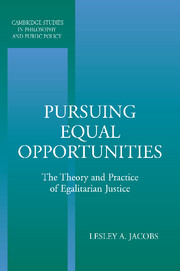2 - Equal Opportunities as a Regulative Ideal
Published online by Cambridge University Press: 05 June 2012
Summary
INTRODUCTION
What kind of equality should we be concerned with pursuing? How do we judge whether our institutions or practices in society are more or less egalitarian? In this chapter, I propose a theory of equality of opportunity designed to answer these two questions. Equality of opportunity in its general form is probably the most familiar account of egalitarian justice. At the core of equality of opportunity, in my view, is the concept that in competitive procedures designed for the allocation of scarce resources and the distribution of the benefits and burdens of social life, those procedures should be governed by criteria that are relevant to the particular goods at stake in the competition and not by irrelevant considerations such as race, religion, class, gender, disability, sexual orientation, ethnicity, or other factors that may hinder some of the competitors' opportunities at success. This concept of equality of opportunity is a very broad and general idea that needs to be interpreted in order for its practical import to be clear. Models of equality of opportunity are particular interpretations of that concept. They can vary both with regard to the key elements of equality of opportunity and what can be said to be its implications. The first three chapters of this book are designed to advance and defend one particular interpretation of this broad concept of equality of opportunity (which I refer to as the three-dimensional model of equal opportunities as a regulative ideal).
- Type
- Chapter
- Information
- Pursuing Equal OpportunitiesThe Theory and Practice of Egalitarian Justice, pp. 10 - 47Publisher: Cambridge University PressPrint publication year: 2003



